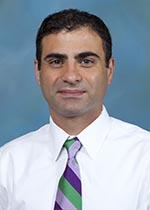Imagine this: A surgeon about to perform a gallbladder removal, hernia operation or colorectal procedure takes his seat at the console of a robotic surgical system. He views a 3D high-definition image of the area he’s about to operate on, and then his hands grip the master controls below the display. His hands and wrists are positioned relative to his eyes, allowing the robotic system to translate his hand, wrist and finger motions into the precise, real-time movements of surgical instruments inside his patient via a single incision.
Imagine this: A surgeon about to perform a gallbladder removal, hernia operation or colorectal procedure takes his seat at the console of a robotic surgical system. He views a 3D high-definition image of the area he’s about to operate on, and then his hands grip the master controls below the display. His hands and wrists are positioned relative to his eyes, allowing the robotic system to translate his hand, wrist and finger motions into the precise, real-time movements of surgical instruments inside his patient via a single incision. This scene isn’t the providence of cutting-edge science fiction; it happens regularly at Sinai Hospital, which has recently been designated as an Epicenter for robotically-assisted general surgery.
Dr. Youssef is widely respected for his expertise, and surgeons from around the country come to Sinai to observe and learn from him. “Teaching has helped me to refine my skills,” he says. He’s quick to add that performing robotically-assisted surgeries is easier on a surgeon ergonomically; it gives them a more complete view of the surgical site and “seven degrees of articulation, and a greater dexterity.”
Traditionally, robotically-assisted surgeries have been reserved for gynecologic and urologic procedures; by using this technology to help patients who have hernias or colorectal issues, or need their gallbladders removed, Dr. Youssef is bringing the considerable benefits of robotically-assisted surgery to a broader range of patients. Because these procedures only require one incision through the belly button, there’s no scarring and minimal blood loss; this reduces healing times and enhances overall patient comfort. The efficiency of robotically-assisted surgery actually makes it a more cost-effective option; an option that Dr. Youssef says is being sought out by patients all over the Greater Baltimore area and well beyond.
“Robotically-assisted surgery is viable for everyone – even patients who might not be good candidates for other kinds of surgical procedures, such as people who are elderly or morbidly obese, or have acute conditions,” Dr. Youssef explains. He says that anyone who comes through Sinai Hospital’s ER-7 needing a gallbladder removal can receive robotically-assisted surgery. This commitment to innovation is the true standard of an Epicenter and the hallmark of good patient care. For Dr. Youssef, it’s only as sign of things to come: “I’m very proud that we can offer the very best outcomes for our patients.”

